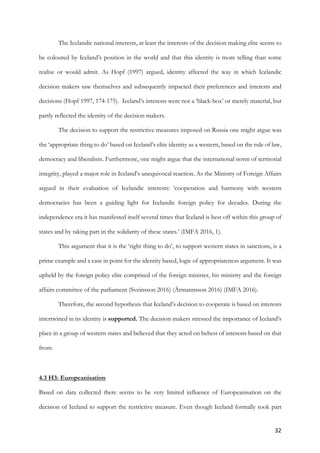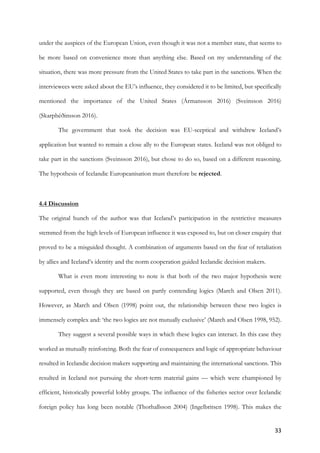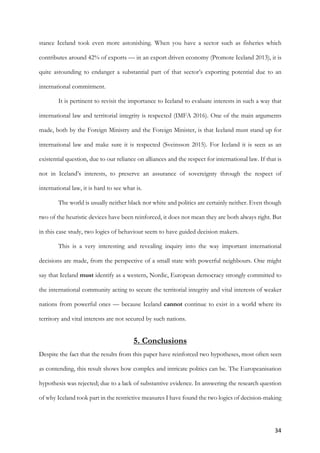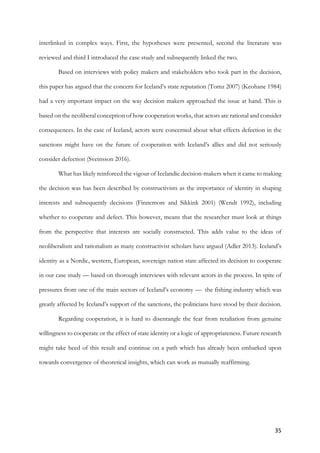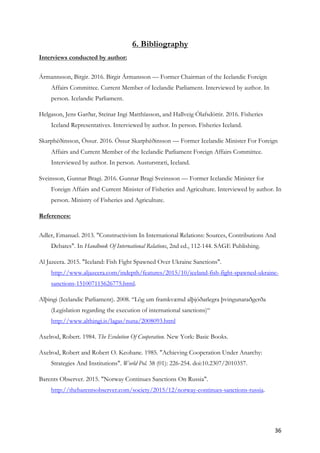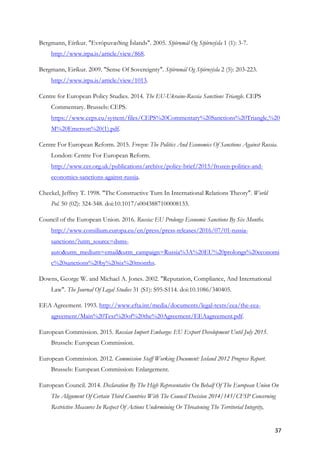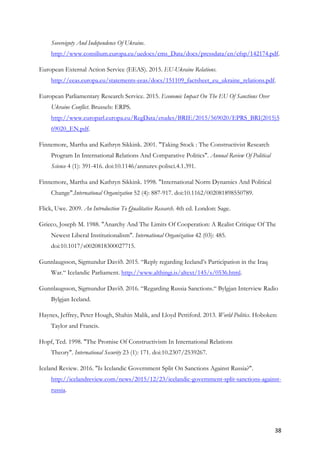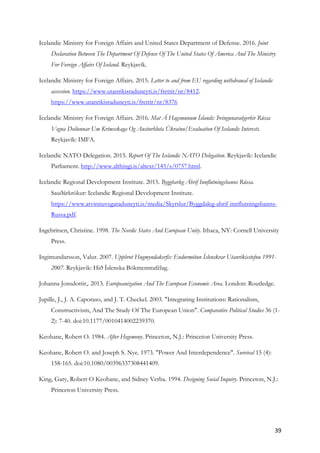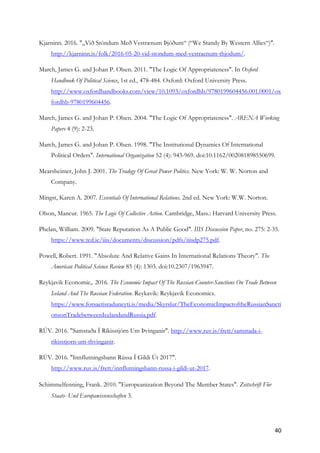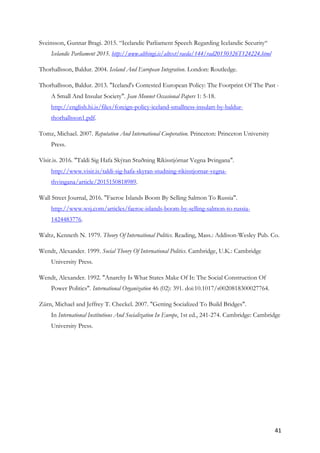This document is a dissertation cover sheet submitted by a student at the London School of Economics. The student's dissertation is titled "Fish, Identity Or Reputation: Iceland’s Participation in EU Restrictive Measures Against Russia" and has a word count of 10,000 words. The student is enrolled in the MSc EU Politics program. The cover sheet provides information on the submission deadline, the student's candidate number, a statement of authenticity signed by the student, and a confirmation that the student understands the university's plagiarism policy.
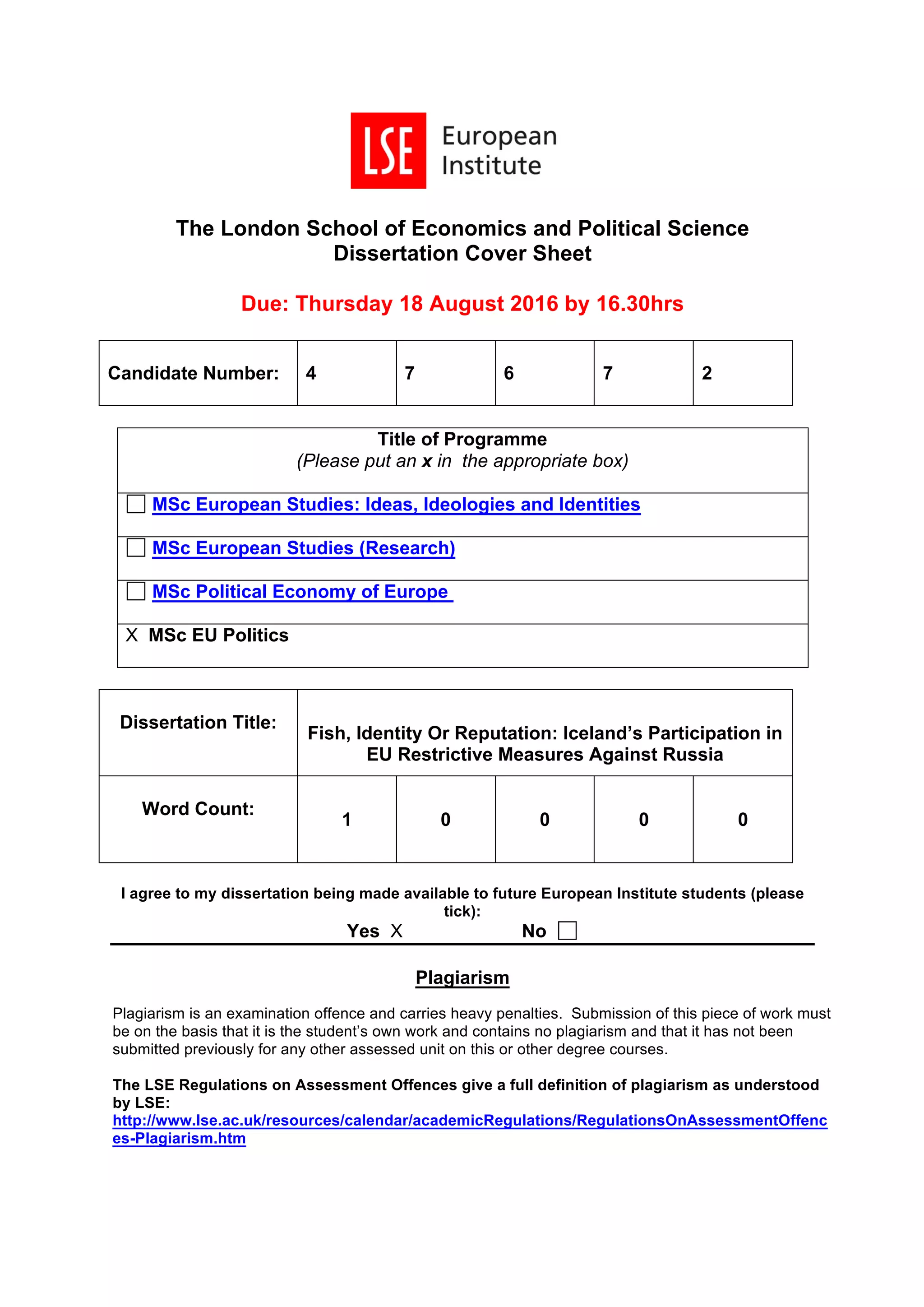
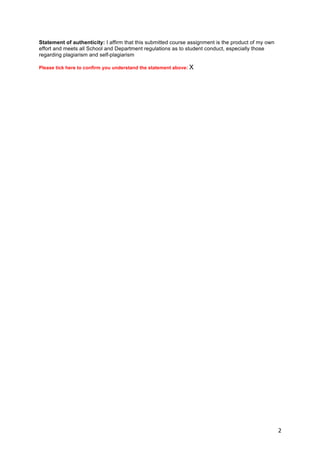
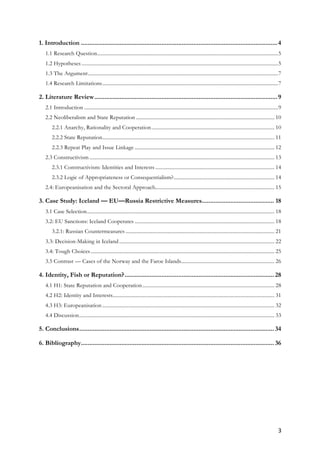
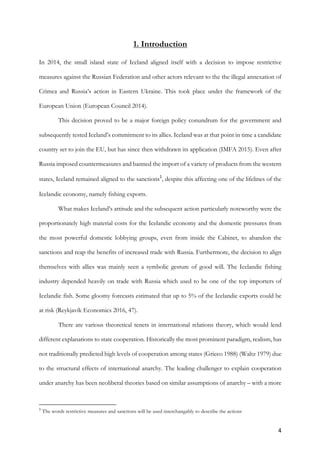
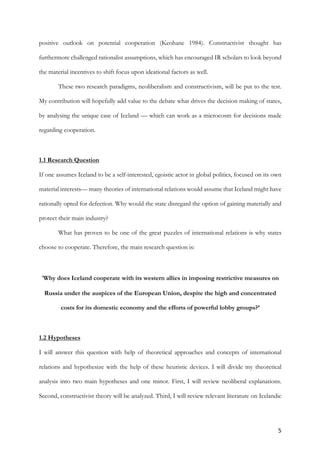
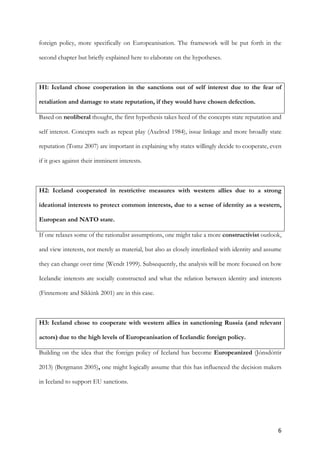
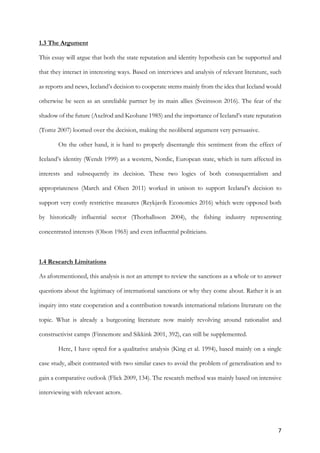
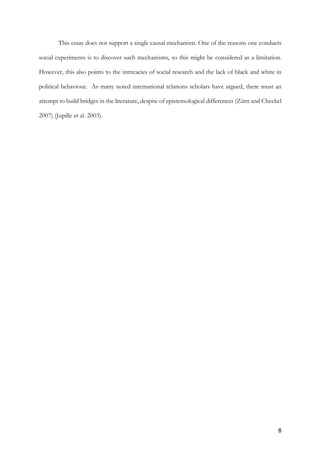
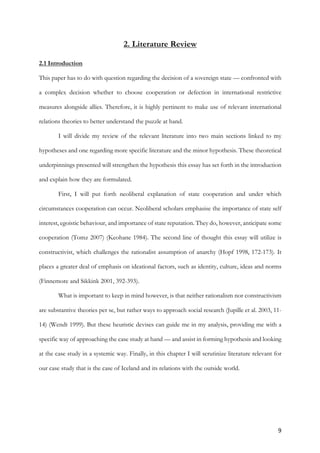
![10
2.2 Neoliberalism and State Reputation
‘Leaders who care enough about the future will calculate costs of forgoing cooperation tomorrow outweigh
the immediate gains from behaving selfishly today.’ (Tomz 2007, 5).
This chapter brings to the fore rationalist ideas which will be applied to better understand
cooperation between states within an anarchic system. The label rationalist lends itself to a very
broad definition. I will discuss some main assumptions related to the mainstream literature of
rationalist theories, which mainly fall within neoliberal2
scholarship. I have no intention of covering
every tenant of neoliberal thought — that is out of the scope of this paper. I aim to focus and
highlight main assumptions to extract effectively what is most helpful for my analysis.
Neoliberalism places an emphasis on absolute gains as opposed to relative gains and is
more optimistic of state cooperation (Powell 1991). Furthermore, the essence of the idea of state
reputation, touted as: ‘[…]the linchpin of the dominant neoliberal institutionalist theory of
decentralised cooperation.’ (Downs and Jones 2002, 95).
Subsequently, I will cover three main key terms or themes that will be put to the forefront
in my analysis: First, some main concepts of IR will be briefly introduced. Second, the idea of state
reputation in international relations will be corroborated, and third more specifically the concepts
of repeat play and issue linkage will be analysed.
2.2.1 Anarchy, Rationality and Cooperation
The state of anarchy in world politics is one of the main philosophical assumptions of rationalist
theories in general to describe the structure of international relations. It is very apparent in
neorealist theory which stresses the anarchy of structure, whereas actors will act based on the
constraints that defines the strategic settings in which they interact — and anarchy as such would
2 This framework has been labelled in a variety of ways, such as: Rational choice theories, functional regime theory,
rational choice institutionalism or even simply institutionalism. From now on I will use the label neoliberalism, for
simplification.](https://image.slidesharecdn.com/971b9bb2-7820-48b3-9fb2-9cc78805acd1-170225162516/85/Fish-Identity-or-Reputation-10-320.jpg)
![11
apply certain behaviour (Powell 1994, 315). Neoliberalism partly shares this notion of international
anarchy, but the theory nuances some of its assumptions to better address cooperation (Keohane
1984, 7-10).
Scholars such as Keohane (1984) are not as pessimistic regarding cooperation as
mainstream realist theory (Keohane 1984, 65-67). Neoliberals utilize ideas on cooperation between
egoistic actors, which are based on game theory (Axelrod 1984, 4-5). This broad framework
possesses different tenants which share similar assumptions on state behaviour and the nature of
their cooperation— or lack thereof.
Cooperation has been one of the main puzzles for IR scholars. Many neorealists, place
emphasis on the role of hegemony in world politics and how hegemons influence other states
(Mearsheimer 2001). Neoliberal thought on the other hand takes a different approach. In his
seminal work, Keohane (1984), tries to explain cooperation in the absence of hegemony, whilst
accepting the rational-egoist assumptions. Axelrod and Keohane (1985) argue that cooperation
can indeed be achieved in anarchy. However, it should be differentiated from harmony and it can
appear where one finds conflicting and complementary interests. According to their definition
cooperation occurs: ‘[…]when actors adjust their behaviour to the actual or anticipated preferences
of others.’ (Axelrod and Keohane 1985, 226).
2.2.2 State Reputation
One of the pillars of the neoliberal reasoning is the idea of state reputation. Tomz (2007) articulates
the puzzle of cooperation and state credibility well when he analyses cooperation in international
debt (Tomz 2007, 4). As Phelan (2009) elaborates eloquently: ‘Reputation provides a reason for
states to comply with costly commitments in the anarchy of international relations, allowing
cooperation without friendship between egoists.’ (Phelan 2009, 3). States in the international
system are more willing to take on costs on local actors to preserve their state reputation — if in
turn they are promised further cooperation in other areas (Phelan 2009, 3). Based on this line of](https://image.slidesharecdn.com/971b9bb2-7820-48b3-9fb2-9cc78805acd1-170225162516/85/Fish-Identity-or-Reputation-11-320.jpg)
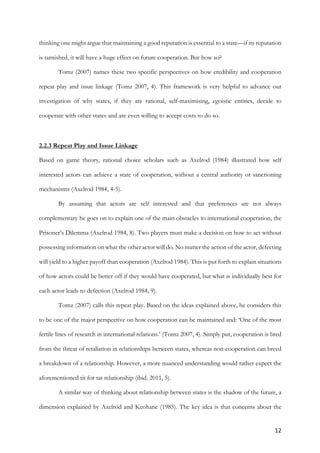
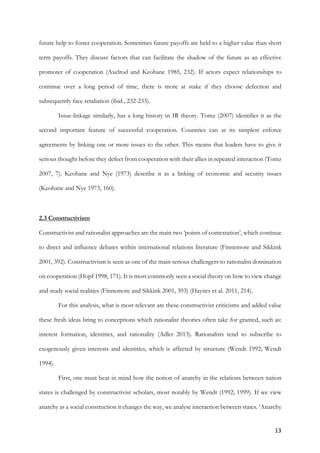
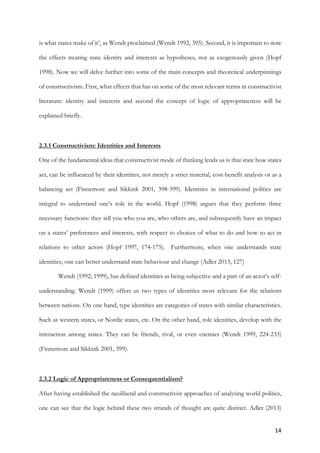
![15
argues that constructivists perceive the relationship between action and rationality differently from
rationalists. He differentiates between instrumental rationality on one hand and practical or
communicative rationality on the other. The latter, being more sensitive to historical, social and
normative realities. When constructivist theorists highlight the the logic of appropriateness, it
stands in contradiction of rationalist logic. This means that actors do not always choose the most
rational or effective alternatives, but rather the ones that fit with their identities (Adler 2013, 124-
125).
March and Olsen (2011) have persuasively identified a logic of appropriateness to describe
the behaviour of actors. This ‘logic’ perceives human action to be: ‘…driven by rules rules of
appropriate or exemplary behaviour, organized into institutions.’ (March and Olsen 2011, 478).
They see a logic of consequentiality as being driven by: ‘possible rules and interpretations as
alternatives as a rational choice problem.’ (March and Olsen 2004, 5). The logic of appropriateness
they argue: ‘[…] contrasts the current interpretation of politics that assumes self-interested,
egoistic, rationally calculating actors, instrumentalism and consequentialism. In the latter
perspective [the logic of consequentialism] simply reflect interests and power, or they are
irrelevant.’ (ibid. 2004, 5).
2.4: Europeanisation and the Sectoral Approach
Before going into further detail on the case study it is important to note the academic literature on
Icelandic foreign policy and its Europeanisation. Despite the fact that Iceland is not a member of
the EU, it has been recorded by numerous of scholars (Jonsdottir 2013) (Bergmann 2009).
Iceland can be established as a reluctant European in terms of European integration,
working on the edge (Thorhallsson 2004). For the largest part of the 20th
century it was reliant on
the United States as their closest ally (Thorhallsson 2013) (Ingimundarsson 2007). After the US
closed its military base in Iceland, in 2006 the government had to realign themselves](https://image.slidesharecdn.com/971b9bb2-7820-48b3-9fb2-9cc78805acd1-170225162516/85/Fish-Identity-or-Reputation-15-320.jpg)
![16
(Ingimundarson 2007). Jónsdóttir elaborates the effects of Europeanisation on Iceland as an
unintended side-effect of the EEA Agreement (Jónsdóttir 2013).
Europeanisation can be understood as a change within domestic structures due to
pressures from the European level. It can also be described more broadly as the influence of formal
and informal rules in governance, ‘[…] the way of doing things’ (Schimmelfenning 2010).
Jónsdóttir’s findings are quite remarkable, based on case studies and interviews with experts in the
first holistic assessment of Iceland’s Europeanisation she finds that Iceland can be more likely
download EU policies than EU member states (Jónsdóttir 2013, 147). Even though Iceland did
not necessarily mean to find the European Union, one might say that the EU found Iceland.
Iceland’s identity as a sovereign nation is another crucial aspect in both its reluctance to
join the EU and often the way it conducts its foreign policy (Bergmann 2009). The political elite
has been described as ‘realistic’: ‘[..] searching for concrete economic advantages from all overseas
activities and preferences.’ (Thorhallsson 2013, 13). The realist nature of Iceland’s political elite
fits very will with Iceland’s security arrangements with NATO and the US. Which is rooted in a
bilateral defence agreement between the two countries and NATO cooperation (IMFA and DoD
2016).
One final thing of importance is what one can described as the sectoral approach, which
Ingelbritsen (1998) used to better understand the European integration of Nordic states. Her
argument, a neoliberal one is based on the idea that leading sectors because of their importance to
the Nordic economies and the way the economies are set up in the corporatist fashion, can shape
national interests and have political interests (Ingebritsen 1998). In her chapter on Iceland she
states that: ‘fish is the national interest’ (ibid. 1998, 126).
This is linked to the rationalist idea often associated with Olson’s (1965) analysis of public
goods as much of our analysis thus far – that special interests often override diffused more
common interests (Olson 1965). This general idea is very relevant to this discussion especially the](https://image.slidesharecdn.com/971b9bb2-7820-48b3-9fb2-9cc78805acd1-170225162516/85/Fish-Identity-or-Reputation-16-320.jpg)
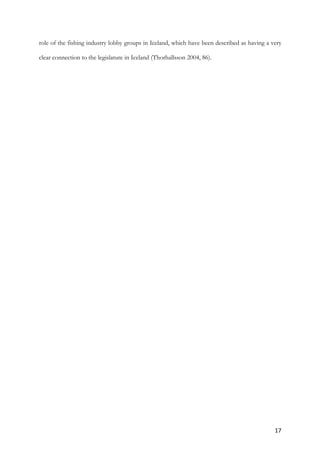
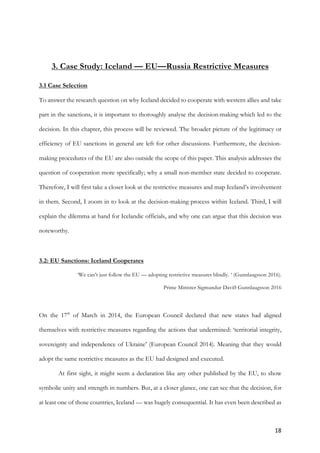
![19
the hardest political decision of then Minister of Foreign Affairs Gunnar Bragi Sveinsson — nota
bene, the same minister which scrapped Iceland’s EU application (Sveinsson 2016). Alongside
Iceland close allies of the EU and possible candidates were also found on the list (European
Council 2014).
The EU restrictive measures were put into practice to condemn the actions of the Russian
Federation in Crimea and Sevastopol – and the conflict in eastern Ukraine more generally (EEAS
2015, 3). The main reasons for imposing these sanctions was to send a staunch warning to Russia
that illegal annexation in the 21st
century was out of the question.
The sanctions imposed by the EU have been neatly categorised by Bond et al. (2015). The
so-called tier 1 and tier 2 sanctions were put into practice on the 17th
of March in 2014 and targeted
individuals, companies and actors which were complicit in the illegal takeover of Crimea and
Sevastopol. These were coordinated by the EU and the US (Bond et al. 2015, 4) (Council of the
European Union 2016).
Most consequential were the economic sanctions or tier 3 sanctions, which were imposed
following the shooting down of a passenger plane MH 370 in Ukraine. These economic sanctions
were targeted at the Russian government and included an arms embargo an export ban and
restrictions on lending amongst other things (Bond et al. 2015, 4). These sanctions were aligned
to the implementation of the Minsk agreements by Russia, which could eventually result in a step
towards more peaceful relations between the west, Ukraine, and Russia (Council of the European
Union 2016).
The atmosphere in Europe leading up to the ‘targeted sanctions’ imposed by the EU and
other western allies has been quite volatile. Russia was seen: ‘[..] to have broken every basic
principle in the Helsinki Final Act of 1975 concerning the respect for the territorial integrity and
sovereignty of states, and repudiation of the threat of force.’ (Emerson 2014, 2). Therefore, it was
seen of utmost importance mainly for European and North American leaders to condemn Russia’s
actions in Ukraine – and furthermore take action and unity of Western states. This triangle that](https://image.slidesharecdn.com/971b9bb2-7820-48b3-9fb2-9cc78805acd1-170225162516/85/Fish-Identity-or-Reputation-19-320.jpg)
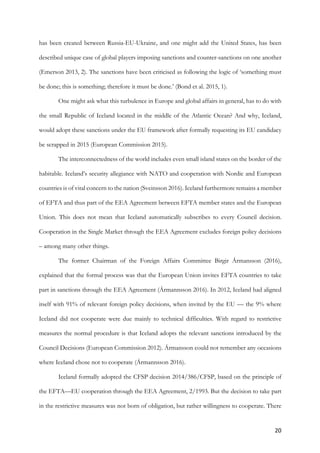
![21
is no clause in any agreement between Iceland and any other actor which states that Iceland should
or should not take part in sanctions of any kind. As a sovereign state it is to take independent
decisions.
What is even more interesting to note is that Iceland’s participation in the sanctions is
mainly symbolic. The former foreign minister who took the decision conceded that: ‘[..] from
Iceland’s point of view the sanctions were symbolic. There is no real trade with any of the products
or financial services that were listed. The only project affected was one small submarine – which
could be used for warfare — but was built for oil drilling.’ (Sveinsson 2016).
3.2.1: Russian Countermeasures
On the 6th
of August in 2014, Russian President, Vladimir Putin signed decree banning the import
of a variety of products, including: agricultural products, raw materials, fish and other foodstuff
from the countries which had signed the sanctions against Russian actors (ERPS 2015, 3). These
sanctions are still in place and affect all EU countries, but the effects vary considerably; mainly
affecting producers in the agricultural sector within the EU member states (ERPS 2015, 4-6). A
year later, Iceland along with Albania, Montenegro and Liechtenstein were added to the list of the
states affected by the countermeasures (ERPS 2015, 3) (IMFA 2016, 7).
The countermeasures imposed by Russia proportionately hit Iceland more negatively than
most other countries (Reykjavik Economics 2016, 5). This is due to the reliance of the Icelandic
economy on seafood exports, it being among the largest seafood exporters in the world — and
how relatively important the Russian market is to the seafood industry — especially for mackerel
(Reykjavik Economics 2016, 5). The fisheries lobby group Fisheries Iceland and its main
spokesperson Jens Garðar Helgason, criticised the decision to join the sanctions due to a lack of
strategic thinking, a lack of information flow and a lack of consideration for interests of the fishing
industry (Helgason 2016).](https://image.slidesharecdn.com/971b9bb2-7820-48b3-9fb2-9cc78805acd1-170225162516/85/Fish-Identity-or-Reputation-21-320.jpg)
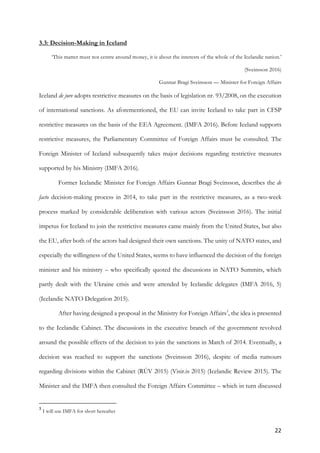
![23
different sides to the decision — the decision of the Committee was simple: ‘To fully support
restrictive measures against Russia.’ (Ármansson 2016). The former foreign minister was as
unequivocal as he asserted that: ‘The only clear option for me was to join [the sanctions].’
(Sveinsson 2016).
For twelve months, after the original decision was reached by the Icelandic government in
March of 2014 and until August 2015, when Russians imposed an import ban on a variety of
Icelandic products (IMFA 2016, 18), all hell broke loose. Fisheries lobby groups representatives
have described it as an ‘extremely stressful summer of 2015.’ (Ólafsdóttir 2016) and Foreign
Minister Sveinsson described it as a: ‘serious blow.’ (Al Jazeera 2015). He had expected the
Russians to add Iceland to the list, but the ferocity and disproportionality surprised him (Sveinsson
2016). The lobby groups representing the fishing industry tried to make the case that this
countermeasure imposed by the Russians was too serious a blow – and tried to evaluate the
interests at stake for the fishing industry (Helgason et al. 2016).
What followed might be described as a turf-war between the fishing lobby groups on one
side and the foreign minister and his ministry on the other. Former foreign minister Sveinsson
describes pressures as high and accused the lobby groups of wanting Iceland to: ‘change horses in
midstream’, but feels he and his ministry did a good job of keeping the fishing lobby groups
informed (Sveinsson 2016).
Three reports were subsequently released analysing the impact of the countermeasures.
The first was from the Regional Development Institute in 2015, which described highly negative
impacts on around ten communities in Iceland and estimated that there could be a serious loss of
wages for employees (Icelandic Regional Development Institute 2015, 2-3).
The latter was prepared on the behest of an ad hoc task force from various government
agencies and Fisheries Iceland (SFS) to assess the economic impact of the Russian counter-
sanctions (Reykjavík Economic 2016). It was published in early 2016 and their outlook was quite
bleak — highlighting the loss of revenue of Icelandic companies and the loss of trade that could](https://image.slidesharecdn.com/971b9bb2-7820-48b3-9fb2-9cc78805acd1-170225162516/85/Fish-Identity-or-Reputation-23-320.jpg)
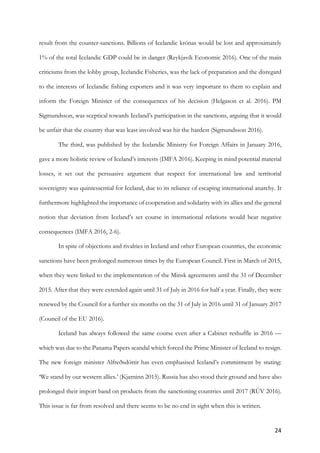
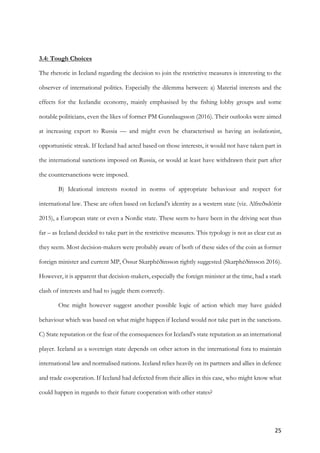
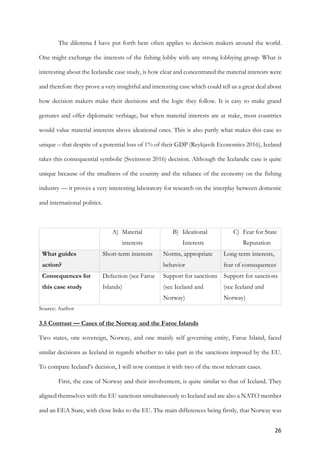
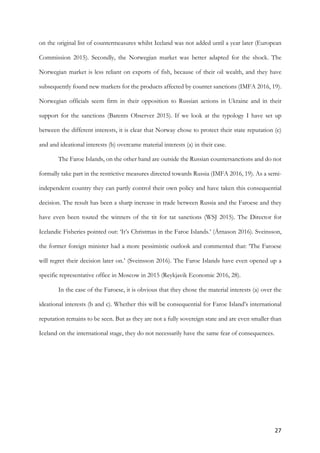
![28
4. Identity, Fish or Reputation?
Now I will thoroughly assess which hypothesis, if any, fits with the case and if they can provide us
with a better understanding of how the decision was made and sustained. The hypotheses provided
in the introductory chapter will be assessed and tested in turn and either supported or rejected.
4.1 H1: State Reputation and Cooperation
‘To disrupt the western alliance would be considered a major deviation from Icelandic foreign policy [..] and
would in a best case scenario result in our allies seriously questioning which journey the Icelandic officials have
chosen to embark upon and furthermore negatively impact the relationship with our closest allies, both within
the EEA and NATO.’ (IMFA 2016,4)
The above quotation perhaps best captures the spirit of the state reputation hypothesis, which
assumes that Iceland took part in the sanctions mainly because they feared a fall out in the relations
with their main allies and a major blow to their reputation as a reliable partner. In this chapter we
assume state rationality and egoistic behaviour and make use of neoliberal theories on cooperation
to try to understand the behaviour of Icelandic officials.
In the case of Iceland, we see that Iceland cooperated with its allies, based on Axelrod’s
and Keohane’s (1985) definition on cooperation, they adjusted their behaviour to the preferences
of western allies (Axelrod and Keohane 1985, 226). They did this by aligning themselves to the
sanctions imposed by the EU on Russia. The question remains, what drove the decision makers
to do so? If we assume Iceland is a rational, egoistic actor, focused on serving its own interests
(Keohane 1984, 5-17), why should it take part in international sanctions regarding a conflict far
away from its borders, especially if it damages its local economy?
The idea of the importance of state reputation championed by neoliberal scholars (Tomz
2007) provides us with a very helpful answer to this puzzle. As explained earlier it provides states](https://image.slidesharecdn.com/971b9bb2-7820-48b3-9fb2-9cc78805acd1-170225162516/85/Fish-Identity-or-Reputation-28-320.jpg)
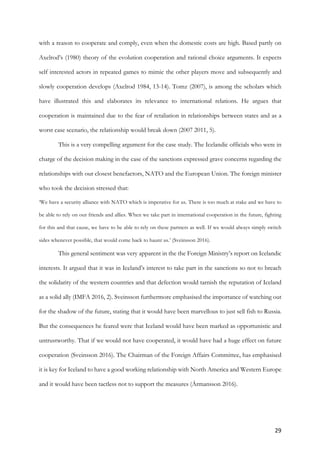
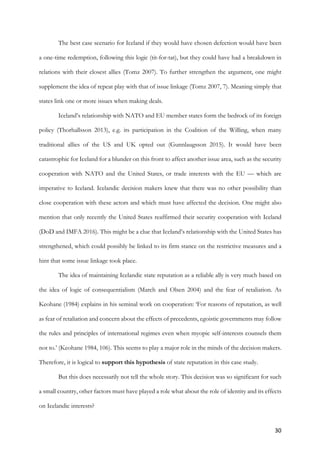
![31
4.2 H2: Identity and Interests
‘This is a matter of principles — obviously we align ourselves with the countries which stand by our side.’
Minister for Foreign Affairs Gunnar Bragi Sveinsson
(Sveinsson 2016)
One of the most important contributions that constructivist thought brings to IR was the idea that
identities could change and affect state interests (Hopf 1997, 174-175). As Checkel (1998) has
argued, one of the main advantages of constructivism is that of: ‘[..] expanding the theoretical
contours of IR. By exploring issues of identity and interests bracketed by neoliberalism [..]’
(Checkel 1998, 325). This is based on the ontological position that the international structure can
be socially constructed – but not set in stone as anarchic, hostile and based on material interests
(Wendt 1992). In the case of Iceland, one can persuasively argue that Iceland’s sense of identity as
a: western, NATO, and Nordic state played a major role in the decision to support the restrictive
measures. All sources both, both interviews and reports that support the decision do so on the
basis of Iceland’s identity. All of the decision makers realised that Iceland’s participation in the
sanctions was partly based on symbolism – of choosing a block (Sveinsson 2016) (Ármansson
2016) (Skarphéðinsson 2016).
The foreign minister at the time considered the decision to be based on principle and he
asserted that it reflected the group Iceland wanted to align themselves with in general; EU, North
America, the Nordic countries adding that this is the group of nations Iceland belongs with
(Sveinsson 2016). This rhetoric reflects Wendt’s assumption of state identity being both type
identities: Iceland belonging to a group of liberal, democratic, western countries, and furthermore
role identities: Seeing the Russians as foes and the western states as friendly (Wendt 1999, 224-
233).](https://image.slidesharecdn.com/971b9bb2-7820-48b3-9fb2-9cc78805acd1-170225162516/85/Fish-Identity-or-Reputation-31-320.jpg)
